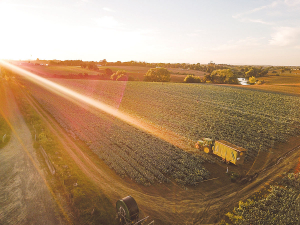Subsidies keeping wind, solar generation viable
OPINION: I recently wrote an open letter to the Prime Minister because at a recent Federated Farmers meeting, Chris Luxon told me wind and solar generation is not subsidised.
 Prices of vegetables will only get pushed up further if vegetable growers are forced into the ETS, say Vegetables NZ and Potatoes New Zealand.
Prices of vegetables will only get pushed up further if vegetable growers are forced into the ETS, say Vegetables NZ and Potatoes New Zealand.
Vegetable growers are warning that an emissions trading scheme (ETS) will only push up prices of produce, lower consumption and make them less competitive in export markets.
In a joint submission to the Ministry for Environment (MfE) two weeks ago, Potatoes New Zealand and Vegetables NZ (VNZ) say they object in principle to being brought into the ETS - either directly or via the mechanisms proposed in the consultation document, Pricing agricultural emissions.
They claim the proposal isn't effective, practical or equitable.
They point out that fresh vegetable and potato growers collectively account for only 0.032% of all agricultural emissions and should be exempt, as are other minor contributors.
"If the emissions levy were to be increased to a point that it would create change, that change would be entirely counter-productive and result in exacerbating the cost-of-living crisis, a loss of national income from vegetable (and corresponding increases in food imports), and a very real threat to New Zealand's food security and health outcomes," the submission says.
"This would be a direct contradiction of the 2015 Paris Agreement to safeguard food security while managing climate change."
The submission notes that vegetable grower input costs have experienced significant inflation ahead of prices.
Labour costs have increased by more than 4.5% per annum since 2015, and fertiliser prices increased by over 63% in the last year alone but farm gate prices for vegetables have lagged below growers' cost inflation.
The submission says a study conducted earlier this year by VNZ concluded farm-gate prices increased ust 1.7% per annum over the period 2015-2022 - this being only half the rate of retail price inflation for vegetables.
"In consequence, we estimate the average vegetable grower's margin may have halved over the last decade."
About 80% of fresh vegetables are grown for the domestic market.
The submission says as a result of tight growing margins, any material emissions levy for growers would simply increase the price of domestic vegetables, with a corresponding reduction in fresh vegetable consumption, especially for the most vulnerable low socio-economic communities.
"Fresh vegetables are a highly price sensitive category.
"Further price increases, especially with the cost-of-living crisis, are estimated to have a significant impact on New Zealanders' welfare and national health costs."
New Zealand vegetable growers could also become uncompetitive in wider export markets, threatening $700m worth of export trade income.
The submission points out that no other nation is bringing their agricultural sector into emissions trading scheme or implementing a similar emissions levy, and so this could be a significant competitive disadvantage for New Zealand growers who supply export markets.
"Even more concerning, other nations may see opportunity to enter and expand vegetable imports into New Zealand.
"The dumping of subsidised European potato products into the New Zealand market during 2020 as Covid hit domestic sales in the EU is a harbinger of what could occur."
The World Wide Sires National All Day Breeds Best Youth Camp Best All Rounder plaudit has become family affair, with 2026 Paramount Cup winner Holly Williams following in her sister Zara's footsteps.
DairyNZ is giving New Zealand farmers a unique opportunity to gain hands-on governance and leadership experience within the dairy sector.
Herd improvement company LIC has posted a 5.2% lift in half-year revenue, thanks to increasing demand for genetics.
According to the latest Fresh Produce Trend Report from United Fresh, 2026 will be a year where fruit and vegetables are shaped by cost pressures, rapid digital adoption, and a renewed focus on wellbeing at home.
The Roar is a highlight of the game hunting calendar in New Zealand, with thousands of hunters set to head for the hills to hunt male stags during March and April.
OPINION: The past few weeks have been tough on farms across the North Island: floods and storms have caused damage and disruption to families and businesses.